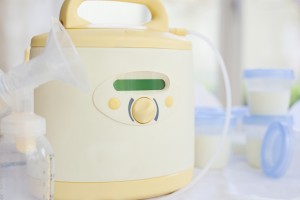 As if moms don’t endure enough during the birthing process, our bodies have something in store for us a few days later.
As if moms don’t endure enough during the birthing process, our bodies have something in store for us a few days later.
Often times as your milk is coming in your breasts will become hard and painful. This is called engorgement. Unfortunately, this condition is not always preventable and it’s most likely going to be quite uncomfortable for mom. In today’s blog, we are going to cover why breasts become engorged, what you can do to prevent it, and how you can find relief.
What is engorgement?
According to Kelly Mom, engorgement typically happens when your milk starts to come in, approximately 2-5 days following the birth of your baby or babies. With proper treatment, engorgement subsides within 12-48 hours. However, without proper treatment, engorgement can last an astounding 7-10 days. Ouch! A mom experiencing engorgement will likely have hard, shiny breasts as a result of the sudden fullness and edema. She may experience tenderness, warmth, or throbbing that can extend all the way up to her armpits. Because the breast is so hard her baby may experience problems trying to latch on. As mentioned previously, engorgement may happen shortly after the delivery but it can also happen with sudden changes to baby’s nursing schedule like when baby starts sleeping through the night or when mom heads back to work.
How to prevent engorgement
Unfortunately, many moms experience engorgement after delivery and there’s simply not much you can do to prevent it from happening during this time. It’s important to keep baby nursing often and frequent emptying of the breast is also helpful. If the breasts are so hard that baby is having problems latching on, Mom can hand express or pump on a low setting for a few minutes prior to feeding. Alternatively, mom can try reverse pressure softening to help baby latch. Engorged breast tissue is more susceptible to damage so it’s important to keep the pump on a low setting. To prevent engorgement from happening later on, keep baby on a regular nursing schedule. If baby suddenly starts sleeping through the night it is possible you’ll need to wake up in the middle of the night and pump to comfort. Emptying your breast in this situation will just tell your body to make more so it’s important to just pump to comfort.
How to find relief
If mom finds that her breast are engorged and uncomfortable there are a few ways to find relief. For many moms, they will be discharged from the hospital with instructions on how much and when to take a pain reliever such as acetaminophen or ibuprofen. Staying on top of these instructions will spare you some, but not all, of the pain. Mom can apply warm, moist heat to help the milk let down. This will not help with the engorgement/edema but may feel good. Cool compresses can be used after a feed, but should not be used directly before a feed. Mom can try a basin soak or soaking her breast in a warm basin or sink. Some moms report that taking a warm shower with the water hitting their back (rather than their breast) can be incredibly helpful. While mom is nursing she can try gentle breast compressions and massage to help reduce engorgement.
